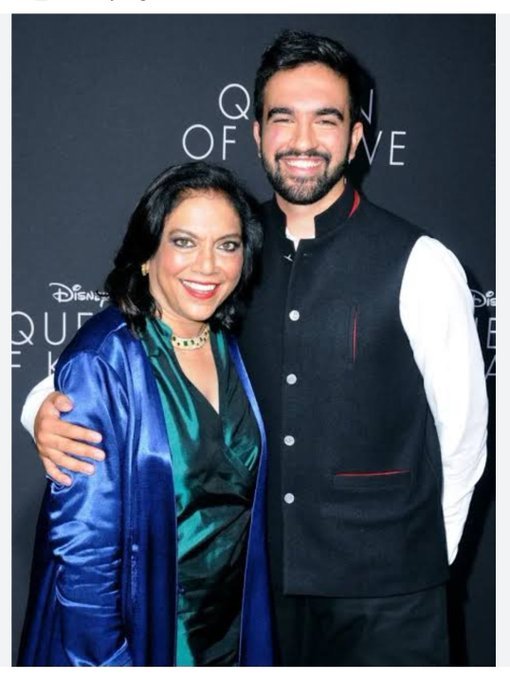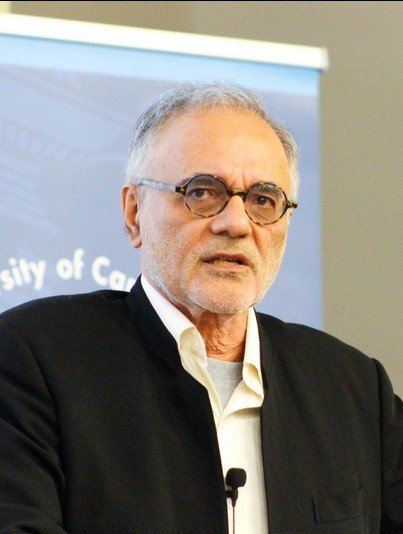In a seismic shift for New York City politics, Zohran Mamdani, a 33-year-old democratic socialist, has clinched the Democratic nomination for mayor, setting the stage to potentially become the city’s first Muslim and Indian-American leader. His stunning upset over former Governor Andrew Cuomo in the June 2025 primary has electrified progressives and rattled the Democratic establishment. Yet, behind Mamdani’s meteoric rise lies the profound influence of his parents—Mira Nair, an Oscar-nominated filmmaker, and Mahmood Mamdani, a distinguished Columbia University professor—whose work in art and academia has shaped his progressive vision. As he heads toward the general election, their outspoken views, particularly on the Israeli-Palestinian conflict, could make them lightning rods for attacks, testing the strength of Mamdani’s campaign and the city’s appetite for change.
Roots of Rebellion: A Family Steeped in Social Justice
Mira Nair: Storytelling with a Conscience

Photo via X (@ZohranKMamdani)
Mira Nair, 67, is a cinematic trailblazer whose films like Salaam Bombay!, Monsoon Wedding, and Mississippi Masala weave narratives of cultural identity, poverty, and resilience. Her refusal to attend a 2013 Israeli film festival, citing opposition to “apartheid,” reflects a commitment to human rights that resonates in her son’s politics (The New York Times, July 1, 2025). Nair’s hands-on support for Zohran’s campaign—canvassing in Queens and cooking biryani for volunteers—underscores her role as both a maternal and ideological anchor. “The world we live in, and what we write and film and think about, is the world that Zohran has very much absorbed,” she told The New York Times (July 1, 2025).
Mahmood Mamdani: Scholar of Power and Resistance

Photo via X (@ZohranKMamdani)
Mahmood Mamdani, 79, is a titan in post-colonial studies, whose book Good Muslim, Bad Muslim critiques global power dynamics, including Israel’s defiance of U.N. resolutions. His work on settler colonialism, particularly its application to the Israeli-Palestinian conflict, has sparked debate, with some labeling it controversial (The Guardian, June 29, 2025). At Columbia University, where he has taught since 1999, Mamdani led teach-ins during 2024 Gaza war protests, challenging the conflation of Israel criticism with antisemitism. While he insists Zohran is “his own person,” he acknowledges that their family’s intellectual environment shaped his son’s worldview (The New York Times, July 1, 2025).
- Zohran Mamdani’s Rise: Zohran Mamdani, a 33-year-old democratic socialist, has emerged as the Democratic nominee for NYC mayor, potentially becoming the city’s first Muslim mayor, following a surprising primary win over Andrew Cuomo.
- Parental Influence: His parents, filmmaker Mira Nair and professor Mahmood Mamdani, shaped his progressive worldview through their work on social justice and post-colonialism, though their views may invite political attacks.
- Controversial Stances: The family’s criticism of Israel, particularly Mahmood’s writings on settler colonialism, could fuel accusations of antisemitism, which Zohran denies, complicating his campaign.
- Campaign Success: Mamdani’s grassroots approach and viral social media strategy resonated with diverse voters, but his progressive policies and family background may polarize opponents.
- Complex Dynamics: While his parents’ legacy bolsters his authenticity, it also risks making him a target in a heated general election, highlighting tensions around identity and politics.
- Mamdani’s Political Ascent: Zohran Mamdani’s unexpected lead in the 2025 Democratic primary for New York City mayor has thrust him into the national spotlight. His victory over a seasoned political heavyweight like Andrew Cuomo signals a shift toward progressive, youth-driven leadership. However, it’s the influence of his parents—Mira Nair, an acclaimed filmmaker, and Mahmood Mamdani, a renowned Columbia professor—that provides the foundation for his bold political vision, even as it opens the door to potential controversies.
- Family Legacy and Political Risk: Mira Nair’s films, such as Salaam Bombay! and Mississippi Masala, tackle themes of identity and injustice, while Mahmood Mamdani’s scholarship critiques global power structures, including Israel’s policies. These stances, echoed in Zohran’s advocacy for Palestinian rights, have drawn scrutiny from pro-Israel groups and political rivals, raising questions about how family ties might shape his campaign’s trajectory.
- Looking Ahead: As Mamdani faces incumbent Eric Adams and possibly others in the general election, his family’s intellectual and activist legacy could both inspire supporters and provoke opponents. The balance between leveraging his roots and navigating attacks will be critical to his bid for City Hall.
A Global Upbringing
Born in Kampala, Uganda, to Indian parents, Zohran moved to South Africa at five and New York City at seven. His childhood was marked by global exposure, from living in Cape Town, where his father directed the African Studies center, to attending red carpet events with stars like Denzel Washington, who held a three-month-old Zohran during Mississippi Masala’s premiere (The New York Times, July 1, 2025). This eclectic upbringing, steeped in discussions of justice and identity, laid the groundwork for his political awakening.
From Queens to City Hall: Mamdani’s Political Journey
A Grassroots Crusader
Zohran Mamdani’s path to political prominence began as a housing counselor in Queens, fighting evictions and advocating for tenants’ rights. Elected to the New York State Assembly in 2020 after defeating incumbent Aravella Simotas, he built a reputation as a fierce advocate for the working class, notably hunger-striking with taxi drivers to secure $450 million in debt relief (Zohran for NYC, October 23, 2024). His mayoral campaign, launched as a long shot, focused on affordability with bold proposals: a rent freeze on stabilized units, free public buses, universal childcare, and city-run grocery stores, funded by a $10 billion tax on the wealthy (CBS News, June 26, 2025).
Defying the Odds
Despite trailing in early polls—Cuomo led with 38% to Mamdani’s 27% in a June 18 Marist Poll—Mamdani’s grassroots momentum and multiracial coalition propelled him to a 56% victory in the ranked-choice primary (Al Jazeera, June 25, 2025; The New York Times, July 1, 2025). His campaign’s disciplined focus on cost-of-living issues resonated in diverse neighborhoods, winning 80% in Ridgewood, Queens, and 79% in Bushwick, Brooklyn (The Guardian, June 29, 2025).
Social Media Savvy: The Viral Vibe
A Digital Native’s Playbook
As a millennial, Mamdani harnessed social media to transform his campaign into a cultural phenomenon. His appearance on TikTok’s Subway Takes, wielding a MetroCard as a microphone, amassed over 3 million views, while videos set to Gwen Stefani’s Hollaback Girl and Japanese pop songs captured the “terminally online” crowd (NBC News, June 27, 2025; The New York Times, June 29, 2025). Supporters, inspired by his high-energy posts, created their own clips, with endorsements from figures like Ilana Glazer and Emily Ratajkowski amplifying his reach (Fast Company, July 3, 2025). “You can just tweet ‘Zohran Mamdani’ and immediately get 1000 likes,” a viral X post proclaimed, reflecting his digital dominance (The Washington Post, June 26, 2025).
Building a Movement
Mamdani’s 50,000-strong volunteer army, led by field director Tascha Van Auken, complemented his online strategy with relentless door-knocking and phone-banking (City & State New York, July 2, 2025). This blend of digital and grassroots efforts turned him into “not just a politician, but a vibe,” as The New York Times noted, drawing parallels to Kamala Harris’s meme-fueled 2024 campaign (NBC News, June 27, 2025).
The Shadow of Controversy: Family Views Under Fire
Targeted by Critics
Mamdani’s family background has become a double-edged sword. The anonymous pro-Israel group Canary Mission has doxxed both parents, citing Nair’s 2013 boycott of an Israeli film festival and Mamdani’s writings on Zionism as evidence of anti-Israel bias (The New York Times, July 1, 2025). Zohran’s own criticism of Israel’s policies toward Palestinians has drawn accusations of antisemitism, which he vehemently denies. “There are a lot of concerns based on a caricature of myself,” he told NPR, blaming over $30 million in smear campaigns that “artificially lengthen the color and length of my beard” and call him a “monster” (NPR, July 1, 2025).
A Polarized Debate
The controversy extends to Mamdani’s wife, Rama Duwaji, a Syrian-American illustrator whose pro-Palestinian artwork, featured in outlets like the BBC and The Washington Post, has nearly 92,000 Instagram followers (Turkiye Today, June 26, 2025). Her prominence could amplify attacks from pro-Israel groups. Amy Spitalnick, CEO of the Jewish Council for Public Affairs, cautioned that “legitimate concerns about antisemitism are being exploited” to divide communities, though she acknowledged valid critiques of Mahmood Mamdani’s statements (The New York Times, July 1, 2025). Political analyst Brendan Nyhan warned that family ties are often weaponized in politics, citing historical examples like attacks on Barack Obama’s father (The New York Times, July 1, 2025).
Personal Touch: Love, Identity, and Advocacy
A Modern Love Story
Mamdani’s personal life adds depth to his public persona. He met Duwaji on Hinge, and their relationship culminated in a civil ceremony in New York City in early 2025, following a Nikkah in Dubai in 2024 (Turkiye Today, June 26, 2025). Duwaji’s illustrations, which advocate for Palestinian rights, align with Mamdani’s commitment to social justice, including support for LGBTQ rights and healthcare for trans youth (Turkiye Today, June 26, 2025).
A Childhood Anecdote
Mahmood Mamdani recalled a telling moment from Zohran’s childhood in Cape Town, where, asked about his color, he answered “mustard” instead of racial categories like white or Black. “I found it most touching,” his father said, highlighting Zohran’s early rejection of rigid labels (The New York Times, July 1, 2025). This story underscores his ability to navigate complex identities, a trait that defines his campaign.
The Road to November: Challenges and Opportunities
The General Election Landscape
Mamdani now faces incumbent Eric Adams, running as an independent after a dismissed bribery case, who has framed the race as a “blue collar” versus “silver spoon” contest (PBS News, July 1, 2025). Andrew Cuomo’s potential continued candidacy adds uncertainty (NBC News, July 1, 2025). Mamdani’s progressive policies and family background could galvanize his base but alienate centrists wary of his socialist label (AP News, June 26, 2025).
A Blueprint for Progressives
His victory offers a potential roadmap for Democrats, as The Guardian noted, emphasizing discipline, vision, and grassroots engagement (The Guardian, June 25, 2025). Progressives like Bhaskar Sunkara see it as proof that “progressive politics, when pursued with vigor, can resonate broadly” (The Guardian, June 25, 2025). Yet, centrists like Senator James Sanders Jr. worry his policies may not translate to broader battlegrounds (AP News, June 26, 2025).
Op-Ed: A Legacy of Courage or a Political Liability?
Zohran Mamdani’s rise is inseparable from the legacy of his parents, whose art and scholarship have imbued him with a fierce commitment to justice. Mira Nair’s storytelling and Mahmood Mamdani’s critiques of power have given Zohran a unique lens, one that resonates with New Yorkers hungry for change. Yet, their outspoken views, particularly on Israel, risk casting a shadow over his campaign. The accusations of antisemitism, while often exaggerated, reflect a polarized climate where family ties can be weaponized.
Mamdani’s ability to navigate these attacks—while maintaining his focus on affordability and equity—will determine his success. His campaign’s viral energy and diverse coalition suggest a new era for NYC politics, but the general election will test whether the Mamdani moniker is a badge of authenticity or a target for division. As New Yorkers decide, the legacy of a filmmaker and a professor will loom large, shaping not just a candidacy but the city’s future.
Table: Key Figures and Their Roles
| Figure | Role | Influence on Zohran Mamdani | Source |
|---|---|---|---|
| Mira Nair | Oscar-nominated filmmaker, mother | Shaped his focus on social justice through films addressing identity and inequality | The New York Times, July 1, 2025 |
| Mahmood Mamdani | Columbia professor, father | Influenced his views on post-colonialism and global human rights, particularly on Palestine | The New York Times, July 1, 2025 |
| Rama Duwaji | Syrian-American illustrator, wife | Reinforces his advocacy for Palestinian rights through her artwork | Turkiye Today, June 26, 2025 |
| Amy Spitalnick | CEO, Jewish Council for Public Affairs | Warns against exploiting antisemitism concerns, acknowledges critiques of Mahmood’s views | The New York Times, July 1, 2025 |
| Brendan Nyhan | Dartmouth government professor | Notes family ties are often used to attack candidates politically | The New York Times, July 1, 2025 |

